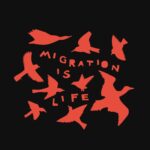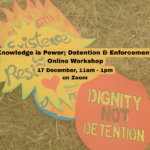The NCADC Annual General Meeting on Saturday was the most significant meeting since the coalition was founded in 1995. Following consultations earlier in the year, members voted to change the name of the organisation, and to amend the constitution to apply for charitable status.
We launched the second edition of our Campaigning Toolkit, and attendees heard from inspiring campaigners, took part in a training workshop, discussed campaigning strategies, ate some wonderful food and chatted with friends old and new.
Fighting for human rights, and celebrating solidarity
The day opened with a welcoming address from NCADC Chair Romain Ngouabeu. Romain is stepping down after six years as Chair, although we are very happy to report that he will remain on the Management Committee. A vote of thanks for his hard work and dedication received loud applause.
Romain was followed by uplifting speeches from two inspiring campaigners for the right to remain. The common themes of both speakers were human rights and solidarity in the face of Home Office injustice.

Paulette Mengnjo is a member of the NCADC Management Committee, and spoke of the solidarity from her church, community and NCADC that motivated her to keep fighting for her rights, and for other women, when she was detained in Yarl’s Wood earlier this year. With her role at NCADC, she continues to support campaigns against detention and for the right to remain. Paulette, who is seeking sanctuary from persecution, urged asylum seekers to lean on their communities for support, not begging for help but asking for solidarity to fight for justice together.
Roseline Akhalu and her campaign team have been an inspiration to NCADC this year, and we were delighted that she travelled from Leeds for the meeting. Rose described how she came to the UK as a masters student nine years ago, but fell seriously ill. She told the meeting of the degrading treatment in detention, and the cruelty of the Home Office lawyers appealing her grant of status, trying to deport her even though experts said that without ongoing treatment (not available in Nigeria) she would die. For Rose, this was a struggle for her life, but also, she said, part of the struggle for human rights. Rose did not give up, and neither did her campaign team, and they fought on until the lawyer won her case; and it was the solidarity and determination of the campaign that saw her through.

Download the annual report (pdf)
Campaigning Toolkit, 2nd edition launched
The morning session concluded with the launch of the second edition of the NCADC Campaigning Toolkit, and a taster session of our training workshops. With the cuts in Legal Aid excluding more and more migrants from access to justice, we see the Toolkit and our training and outreach work as ever more important.
This session dealt with some of the basics:
What do mean by campaigning? What are the risks, and how do we decide if it’s the right thing to do? What goals are we aiming for along the way, and what actions can we take, or ask others to take, to achieve them?
 It was a lively, participative session, and seemed to really get people thinking. We’ll be meeting some of the participants at training sessions in the near future. Particularly looking forward to working with the women from Migrant Artists Mutual Aid, Liverpool, who were at the meeting, following their campaign for Amina and the women of Yarl’s Wood.
It was a lively, participative session, and seemed to really get people thinking. We’ll be meeting some of the participants at training sessions in the near future. Particularly looking forward to working with the women from Migrant Artists Mutual Aid, Liverpool, who were at the meeting, following their campaign for Amina and the women of Yarl’s Wood.
A change of name and constitution
This was the most important business of the Annual General Meeting. Following a review of our work, extensive consultation with members and supporters, and after taking legal advice, the Management Committee had made two major proposals for the meeting to discuss and for members to vote on.
Applying for charitable status
Following a review of our work and finances, extensive consultation with members and supporters, and after taking legal advice, the Management Committee decided to recommend that NCADC should apply to be registered as a charity. This proposal was put to the AGM, and, after questions and discussion, the members voted overwhelmingly in favour, with no votes against the proposal.
In the months prior to the meeting, information on the thinking behind the proposal was distributed, with members and supporters invited to participate in a consultation to give their thoughts. You can read more about the process here >>
A new name: Right To Remain
For some time, the management committee has been considering a change of name, and, following a consultation exercise, members were invited to vote on the proposal at the AGM.
The nature of our work has changed over the years, in response to the changing environment for migrants in the UK. It was felt that the name no longer reflected our work, that the use of the term “deportation” can be confusing, and that it is also a very long and difficult name to say or remember – particularly if English is not your first language.
Earlier this year, supporters and members were invited to take part in a consultation on the proposal. The consultation allowed people to indicate a preference for three suggested names, to propose one of their own, or to stick with NCADC. The responses demonstrated that members were strongly in favour of a change, with support split roughly 50/50 between two names – Right to Remain, and Migration Justice.
At the AGM, the name change proposal was put to members in a two-stage vote. After some very interesting and thoughtful discussion, the members voted unanimously in favour of changing the name, and in the second stage of the proposal, voted to adopt the name Right To Remain, with the strapline Campaigning for Migration Justice.
You can read more about the consultation process and the thinking behind the name change here >>
A day to remember
There was a real buzz at the AGM, something you don’t often have amidst the important but not exactly exciting business of running a not-for-profit organisation. The discussion of our name and constitution and work strategies were not navel-gazing introspection. It was all about how we rise to the challenges of the ever harsher immigration controls that now intrude far beyond the traditional border points and into our communities, workplaces, schools, health centres and so on.
The challenges we face are very real, and are often so disheartening. During the afternoon we paused for a minute’s silent reflection, to pay our respects to the people who drowned in the Mediterranean last week, and for all those who have lost their lives because of border controls.
The mood of the day, however, was defiantly upbeat. We came together to celebrate our solidarity. The more that government policy seeks to divide us and set up barriers to justice and freedom and equality, the more we will unite to campaign for our rights.
Thank you to everyone who came along on the day. Thank you to all our members and supporters. Thank you campaigners for your inspiration. Together we are stronger.

















Discussion: